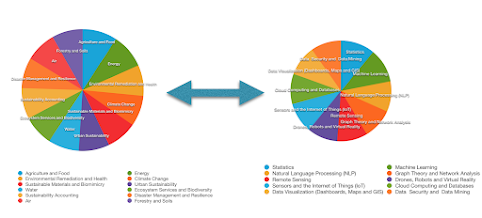I’m a data scientist interested in clean technology - what can I do? Careers in Clean Technology and Data Science continued
Last time, we looked at the skills that someone from a clean technology background would need to acquire to become a full - fledged clean tech data scientist. Today, we’ll take a look at the other side of the balance - if you have a data science background, then how can your skills be applied in the clean technology sector?
Someone who is already a data scientist or is in the software field and looking to break into a clean technology industry or company has a very different problem from the clean tech specialist. To start with, your skills are most likely in algorithms, statistics and data engineering. That means that you can code, build prototype algorithms, build hardware/software interfaces if you’re in sensors or robotics and you know how to store and access data. You probably already have a PhD in physics or maths or another engineering domain or maybe a Masters in computer science.
So, the data science and engineering skills that the clean tech specialist would need to pick up are already in your arsenal. However, where things get interesting is when you start applying these skills in clean tech sectors like water, energy, agriculture, climate change and so on.
When building models - whether they are machine learning models, neural networks, bayesian probabilisitic models, or simpler statistical models - we’ve all learnt that the model is really only as good as the data and the assumptions you use to build the model. Simply running the data through a machine learning library in Python will only get you so far. You’ll be able to generate relationships and equations, but figuring out why certain parameters in the model are important or if you’ve understood how the model responds to certain situations needs an understanding of the domain and the problem you’re trying to solve. So, if a data scientist is trying to build models of crop systems or water flow in treatment systems or predicting how insurance risks are going to change as the climate changes, it’s a good idea to learn more about the actual system.
One way of doing that is to read research papers, review existing literature and work with team members who are specialists in that domain. If you’re someone who’s used to doing research and has a PhD, you may be comfortable doing that on your own. Of course, it will take a lot longer that way - so it depends on how valuable your time is!
The other way is to do a quick, deep dive into courses in the field and learn. If you’re in the United States, there are going to be universities nearby where you could take a few courses in Civil/Environmental/Agriculture/Natural Sciences Departments. Or, if you prefer online learning, MIT’S Open Courseware has several courses that will introduce you to the basics of clean technology.
However, let’s say that you’re someone who’s already a data scientist or software engineer and you would like to get to work immediately in a clean technology industry and learn the system later. There are several companies and organizations that work in clean technology sectors but where the problems that are being solved are closely allied to other sectors. Let’s take a look at one of the highly funded startups in the agriculture sector - Farmer’s Business Network. The company was funded to help farmers improve productivity and reduce costs by better managing their farm equipment. Now, the data science problems they are looking at would be operations, logistics and community building - problems very similar to those that Amazon, Facebook and transportation companies face. Notice that they’re not into crops, water or soil management - all areas where understanding the natural system is key. Now, this is a problem where a data scientist could get started and contribute significantly with some understanding of the sector. A similar example would be starting in the finance or customer service departments where algorithms in fraud detection and customer engagement would go a long way in improving the company’s bottomline.
Similarly, software engineers are in demand in the clean tech industry in general - to build apps, build database systems, do the data engineering and if you’re a hardware expert - to build robots and sensors to monitor and repair systems. Getting started in the clean tech industry would be pretty straightforward for someone who’s interested in working in companies or organizations that do this work.


